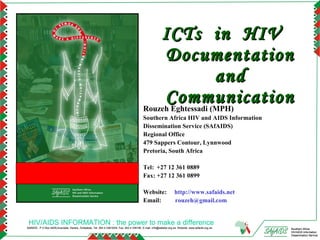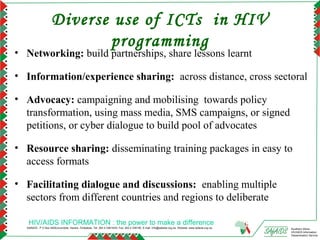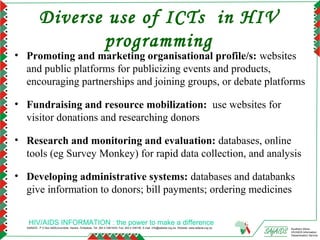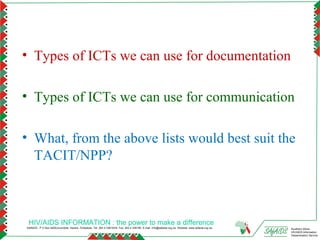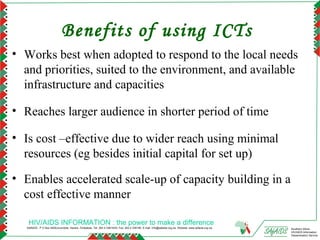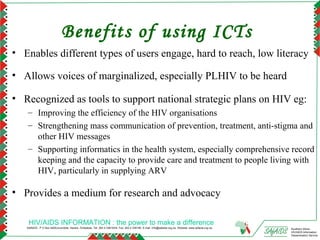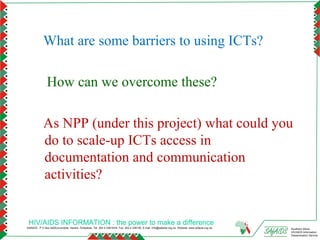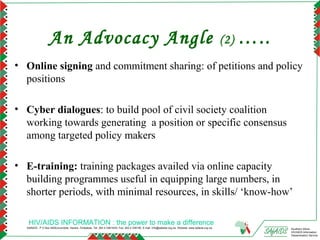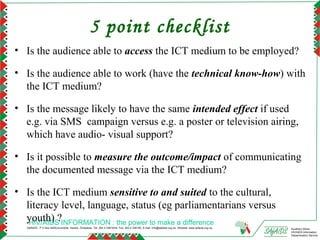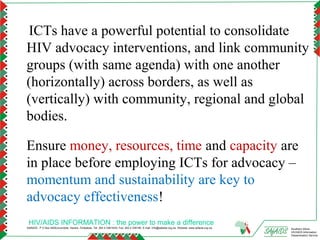ICTs in Documentation & Documentation Advocacy
- 1. ICTs in HIV Documentation and Communication Rouzeh Eghtessadi (MPH) Southern Africa HIV and AIDS Information Dissemination Service (SAfAIDS) Regional Office 479 Sappers Contour, Lynnwood Pretoria, South Africa Tel: +27 12 361 0889 Fax: +27 12 361 0899 Website: http://www.safaids.net Email: rouzeh@gmail.com HIV/AIDS INFORMATION : the power to make a difference SAfAIDS - P O Box A509,Avondale, Harare, Zimbabwe, Tel: 263 4 336193/4, Fax: 263 4 336195, E-mail: info@safaids.org.zw, Website: www.safaids.org.zw Southern Africa HIV/AIDS Information Dissemination Service
- 2. Diverse use of ICTs in HIV programming ⢠Networking: build partnerships, share lessons learnt ⢠Information/experience sharing: across distance, cross sectoral ⢠Advocacy: campaigning and mobilising towards policy transformation, using mass media, SMS campaigns, or signed petitions, or cyber dialogue to build pool of advocates ⢠Resource sharing: disseminating training packages in easy to access formats ⢠Facilitating dialogue and discussions: enabling multiple sectors from different countries and regions to deliberate HIV/AIDS INFORMATION : the power to make a difference SAfAIDS - P O Box A509,Avondale, Harare, Zimbabwe, Tel: 263 4 336193/4, Fax: 263 4 336195, E-mail: info@safaids.org.zw, Website: www.safaids.org.zw Southern Africa HIV/AIDS Information Dissemination Service
- 3. Diverse use of ICTs in HIV programming ⢠Promoting and marketing organisational profile/s: websites and public platforms for publicizing events and products, encouraging partnerships and joining groups, or debate platforms ⢠Fundraising and resource mobilization: use websites for visitor donations and researching donors ⢠Research and monitoring and evaluation: databases, online tools (eg Survey Monkey) for rapid data collection, and analysis ⢠Developing administrative systems: databases and databanks give information to donors; bill payments; ordering medicines HIV/AIDS INFORMATION : the power to make a difference SAfAIDS - P O Box A509,Avondale, Harare, Zimbabwe, Tel: 263 4 336193/4, Fax: 263 4 336195, E-mail: info@safaids.org.zw, Website: www.safaids.org.zw Southern Africa HIV/AIDS Information Dissemination Service
- 4. ⢠Types of ICTs we can use for documentation ⢠Types of ICTs we can use for communication ⢠What, from the above lists would best suit the TACIT/NPP? HIV/AIDS INFORMATION : the power to make a difference SAfAIDS - P O Box A509,Avondale, Harare, Zimbabwe, Tel: 263 4 336193/4, Fax: 263 4 336195, E-mail: info@safaids.org.zw, Website: www.safaids.org.zw Southern Africa HIV/AIDS Information Dissemination Service
- 5. Benefits of using ICTs ⢠Works best when adopted to respond to the local needs and priorities, suited to the environment, and available infrastructure and capacities ⢠Reaches larger audience in shorter period of time ⢠Is cost âeffective due to wider reach using minimal resources (eg besides initial capital for set up) ⢠Enables accelerated scale-up of capacity building in a cost effective manner HIV/AIDS INFORMATION : the power to make a difference SAfAIDS - P O Box A509,Avondale, Harare, Zimbabwe, Tel: 263 4 336193/4, Fax: 263 4 336195, E-mail: info@safaids.org.zw, Website: www.safaids.org.zw Southern Africa HIV/AIDS Information Dissemination Service
- 6. Benefits of using ICTs ⢠Enables different types of users engage, hard to reach, low literacy ⢠Allows voices of marginalized, especially PLHIV to be heard ⢠Recognized as tools to support national strategic plans on HIV eg: â Improving the efficiency of the HIV organisations â Strengthening mass communication of prevention, treatment, anti-stigma and other HIV messages â Supporting informatics in the health system, especially comprehensive record keeping and the capacity to provide care and treatment to people living with HIV, particularly in supplying ARV ⢠Provides a medium for research and advocacy HIV/AIDS INFORMATION : the power to make a difference SAfAIDS - P O Box A509,Avondale, Harare, Zimbabwe, Tel: 263 4 336193/4, Fax: 263 4 336195, E-mail: info@safaids.org.zw, Website: www.safaids.org.zw Southern Africa HIV/AIDS Information Dissemination Service
- 7. What are some barriers to using ICTs? How can we overcome these? As NPP (under this project) what could you do to scale-up ICTs access in documentation and communication activities? HIV/AIDS INFORMATION : the power to make a difference SAfAIDS - P O Box A509,Avondale, Harare, Zimbabwe, Tel: 263 4 336193/4, Fax: 263 4 336195, E-mail: info@safaids.org.zw, Website: www.safaids.org.zw Southern Africa HIV/AIDS Information Dissemination Service
- 8. An Advocacy Angle (1) â¦. ⢠SMS Campaigns: mobilising towards policy transformation, eg sharing of messages prior to constitution reviews, or towards signing of petitions for policy reform ⢠Mass media campaigns: using television, online videos, radio etc with uniform messaging to create mass focus and consensus towards a specific policy agenda that requires change demanded by the public, or by a specific group who will ultimately engage policy makers HIV/AIDS INFORMATION : the power to make a difference SAfAIDS - P O Box A509,Avondale, Harare, Zimbabwe, Tel: 263 4 336193/4, Fax: 263 4 336195, E-mail: info@safaids.org.zw, Website: www.safaids.org.zw Southern Africa HIV/AIDS Information Dissemination Service
- 9. An Advocacy Angle (2) â¦.. ⢠Online signing and commitment sharing: of petitions and policy positions ⢠Cyber dialogues: to build pool of civil society coalition working towards generating a position or specific consensus among targeted policy makers ⢠E-training: training packages availed via online capacity building programmes useful in equipping large numbers, in shorter periods, with minimal resources, in skills/ âknow-howâ HIV/AIDS INFORMATION : the power to make a difference SAfAIDS - P O Box A509,Avondale, Harare, Zimbabwe, Tel: 263 4 336193/4, Fax: 263 4 336195, E-mail: info@safaids.org.zw, Website: www.safaids.org.zw Southern Africa HIV/AIDS Information Dissemination Service
- 10. 5 point checklist ⢠Is the audience able to access the ICT medium to be employed? ⢠Is the audience able to work (have the technical know-how) with the ICT medium? ⢠Is the message likely to have the same intended effect if used e.g. via SMS campaign versus e.g. a poster or television airing, which have audio- visual support? ⢠Is it possible to measure the outcome/impact of communicating the documented message via the ICT medium? ⢠Is the ICT medium sensitive to and suited to the cultural, literacy level, language, status (eg parliamentarians versus youth) ?INFORMATION : the power to make a difference HIV/AIDS SAfAIDS - P O Box A509,Avondale, Harare, Zimbabwe, Tel: 263 4 336193/4, Fax: 263 4 336195, E-mail: info@safaids.org.zw, Website: www.safaids.org.zw Southern Africa HIV/AIDS Information Dissemination Service
- 11. ICTs have a powerful potential to consolidate HIV advocacy interventions, and link community groups (with same agenda) with one another (horizontally) across borders, as well as (vertically) with community, regional and global bodies. Ensure money, resources, time and capacity are in place before employing ICTs for advocacy â momentum and sustainability are key to advocacy effectiveness! HIV/AIDS INFORMATION : the power to make a difference SAfAIDS - P O Box A509,Avondale, Harare, Zimbabwe, Tel: 263 4 336193/4, Fax: 263 4 336195, E-mail: info@safaids.org.zw, Website: www.safaids.org.zw Southern Africa HIV/AIDS Information Dissemination Service

